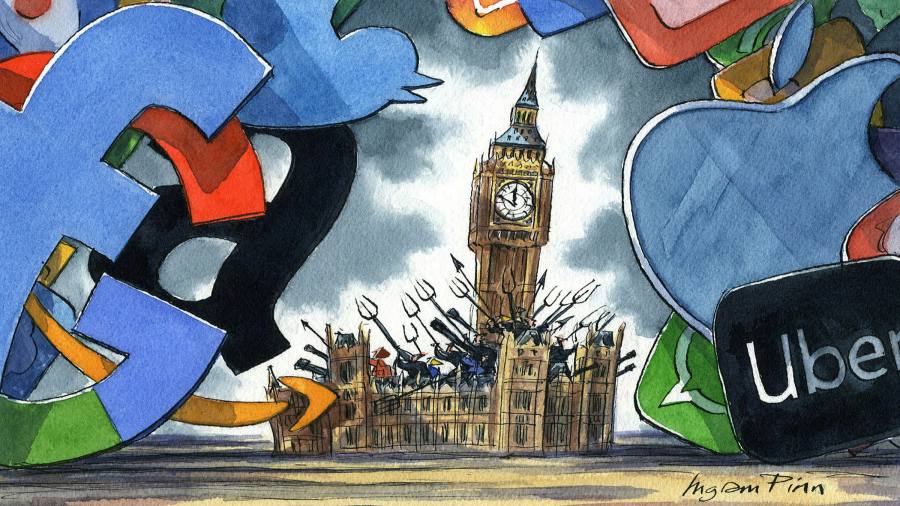[ad_1]
The online game Minecraft has two modes. Players can either create their own digital landscapes or simply try to survive within someone else’s land. It is a choice which should resonate with policymakers as they grapple with a rapidly altering digital terrain too often designed by others.
One has only to imagine Covid-19 happening 20 years ago to appreciate that, from cloud services to communications, from retail to finance, the digital realm is now the architecture of modern society.
In part, this merely magnifies existing issues. Benedict Evans, the tech analyst, argues “when software becomes part of society, all of society’s problems get expressed in softwareâ€. But innovation, while a force for good, is also reshaping our lives. Businesses, communications, cities, even political systems are being altered and destabilised in ways beyond the control of nations.
Two recent events illustrate the point. In Australia, Facebook purged all news content from its site rather than comply with legislation requiring it to pay news providers. Facebook ultimately backed down but its hubris shocked legislators, raising questions about control of systemically important services.
In Britain, Uber lost a court case over the employment status of its drivers. But the defeat masked the broader issue of platforms creating a sharp rise in gig employment, an issue that goes to workers rights, economic security and a new revenue challenge for governments. In both cases the state prevailed but they show that the fight is ferocious and on all fronts of society. Complicating matters is that these services are wildly popular.
The UK is raising its game. Its competition regulator will gain a new digital unit to tackle the tech giants, an online harms bill imposing a new duty of care to users and there is a digital services tax aimed at huge multinationals such as Google, Facebook and Amazon.
But even while getting tougher, the UK, rightly, does not want to be seen as a hostile environment for tech. Post-Brexit, it hopes to attract business by differentiating itself from the EU regulatory regime. Oliver Dowden, the culture secretary, is looking to scale back parts of the EU’s data protection regime without jeopardising a data-sharing deal.
Yet even this more muscular approach misses the scale of the societal challenge. Britain, like many nations, is still using a whack-a-mole approach of discrete regulators tackling issues piecemeal. And tech firms are skilled at playing off rival regulatory imperatives, like data protection versus antitrust policy.
The speed with which issues shift can be seen in social media where the ministerial focus has suddenly switched from child abuse and disinformation to free speech. Shocked by both the social media ban on Donald Trump, and, in the UK, YouTube’s brief removal of Rupert Murdoch’s TalkRadio, ministers plan to use the online harms bill to stop tech firms acting as sole arbiter of what can be published. Platforms will be told to set up a rapid appeal or redress mechanism for content taken down, under rules overseen by the regulator Ofcom.Â
A common thread is disruption from iconoclastic supranational actors, whose compass is set largely in the US. As one minister puts it “these are just early skirmishes with people who think they are more important than governmentsâ€.
While colleagues are pushing Facebook on free speech, the home secretary, Priti Patel, is fighting a losing battle against its plans for end-to-end encryption on messaging which she fears will frustrate law enforcement.
Then there is the ownership of data, the gig economy, the shift to online retail, new forms of transport, an ethical framework for artificial intelligence and so on. And this is to say nothing of the challenges of mass communications to democratic stability.Â
And what of sites of systemic social importance, from search to the cloud services which power most businesses. Do they need to be seen and regulated as essential public utilities?Â
Evans sees a parallel in the auto industry. The first laws set rules for vehicles and manufacturers. But the second phase was about policy for a society reshaped by almost every family owning a car. If cars created the suburbs, computers are changing cities. Governments are heading into that second phase where the thinking must go beyond digital equivalents of speed limits and crumple zones.Â
While the focus for now is on strengthening regulators, ministers do see a case for new thinking. One idea gaining attention in government is a plan mooted by a Lords committee for an overarching digital authority, comprising the existing regulators and other experts, to oversee all regulation but also to look for gaps and potential conflicts and identify future trends. There is no imminent plan for this but one official notes “a growing recognition of the need to look at regulation in the roundâ€.Â
The UK is starting to ask the right questions but policymakers everywhere must stop compartmentalising digital issues and look at the wider picture. They must anticipate change and claim a role in designing the architecture which is altering their societies.Â
In the real world the choices are not as binary as Minecraft’s. But when it comes to the shaping the landscape of society, politicians are still spending too much time in survival mode.
[ad_2]
Source link






